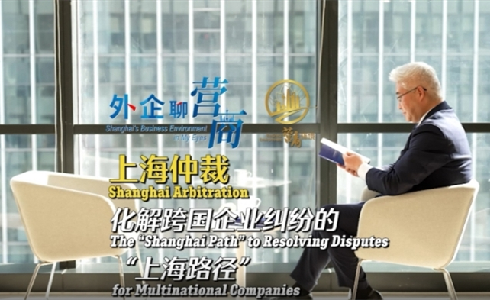Shanghai speeds up Eastern Hub development

A design rendering of the Eastern Hub International Business Cooperation Zone.
Shanghai is accelerating the full-scale development of its Eastern Hub International Business Cooperation Zone, a strategic platform for high-level opening-up. At a press briefing today, officials unveiled three foundational regulatory frameworks designed to support the zone's development and ensure smooth international operations.
Approved by China's State Council in February 2024, the Eastern Hub is positioned near Pudong International Airport and Shanghai East Railway Station. Covering 0.88 square kilometers, the zone aims to create a globally connected, innovation-driven, and service-oriented business hub. The pilot area is set for sealed operations by the end of 2025, full-zone operations by 2028, and overall completion by 2030.
Three new frameworks to support institutional innovation
To guide the zone's development and ensure efficient operations, three key regulatory frameworks have been introduced:
Shanghai's administrative measures, providing legal and operational guidance for the zone's planning, construction, and management.
Customs supervision rules from the General Administration of Customs, enabling streamlined control of goods, baggage, and personal items.
Entry-exit regulations from the National Immigration Administration, supporting more flexible and efficient cross-border movement of people.
These regulations reflect a broader goal: to make the zone a national testing ground for institutional reform and high-standard opening-up. Key policy highlights include:
Facilitated entry and exit for individuals: Invited foreign nationals can enter the zone visa-free for up to 30 days, with extension options. They may also benefit from existing port visa and visa-free transit policies. Domestic residents can access the zone with a special pass.
Simplified customs procedures for personal items: Reasonable, self-use goods brought by foreign visitors are subject only to safety and quarantine checks. Domestic visitors can pre-register re-exportable items for faster clearance upon exit.
Efficient management of goods and logistics: Goods entering or exiting the zone enjoy bonded, tax rebate, and exemption policies similar to those in free trade zones. Commercial service providers in the zone can also move domestically sourced materials in and out via a checkpoint registration model.
Building a new platform for international engagement
The zone is designed as a platform for:
Global business exchange, enabling streamlined visa-free access for invited foreign professionals to support international meetings, exhibitions, product launches, and trade fairs. It also offers duty-free policies for operational equipment and facilitates industry-specific training in fields such as medical devices, aviation, and specialized services.
Cross-border R&D and innovation, with bonded policies and tax exemptions for imported instruments and materials. The zone supports a range of activities, including bonded R&D, cross-border e-commerce, software testing, and data processing. High-standard facilities are being developed for key industries such as biomedicine, semiconductors, AI, aerospace, and new materials to promote international collaboration and technology transfer.
Professional services, allowing foreign-certified professionals to provide services in areas like accounting, finance, law, consulting, and inspection. The zone also supports foreign-invested medical institutions, international healthcare services, and cross-border business models such as offshore trade and digital trade — creating new channels for global resource allocation and business growth.
High-quality infrastructure and services
The zone is being built to international standards, with world-class planning and urban design. It is guided by global best practices and a city-approved regulatory plan that emphasizes spatial coordination, green development, and seamless connectivity between core areas.
It features convention centers, hotels, and mixed-use cultural-commercial hubs, designed to host global exhibitions, conferences, and business meetings, while offering high-end accommodation, dining, retail, and leisure options all in one integrated space.
Comprehensive multilingual services and a convenient payment system create a seamless environment for international professionals, supported by international flight connections and inclusive financial and medical infrastructure.
Officials have emphasized the zone's role in driving regional integration and contributing to Shanghai's status as a global hub for economy, finance, trade, shipping, and sci-tech innovation.


 China's key progress in 14th Five-Year Plan period
China's key progress in 14th Five-Year Plan period  A Guide to Working and Living in China as Business Expatriates (2025 Edition)
A Guide to Working and Living in China as Business Expatriates (2025 Edition)  Foreign tourists eligible for tax refund on 200 yuan purchases
Foreign tourists eligible for tax refund on 200 yuan purchases  play
play 